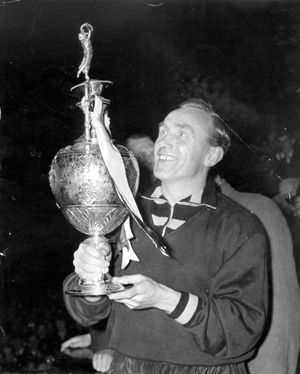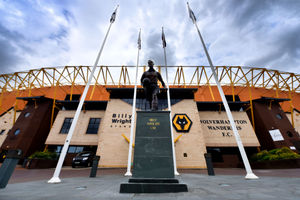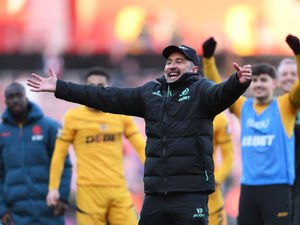Blast from the past: Wolves legend Billy Wright – the national icon
England's quest for World Cup glory starts tonight when they take on Tunisia in Volgograd.
The Three Lions have spectacularly underachieved at recent tournaments.
But Gareth Southgate's players know – if they can fulfil their potential – they have the chance to etch their names into footballing folklore.
One player who will always be remembered as an England great though is Wolves legend Billy Wright.
The Ironbridge-born star became the first ever player to win 100 caps for their country.
But his journey to the top of the game was far from conventional.
As a boy, Wright dreamt of making it as a professional.
And he got his chance when, at 13-years-old, he spotted a newspaper advert calling for talented youngsters to attend a trial day at Wolves.
But things didn't exactly go to plan. At just 5ft 8inches tall, Major Frank Buckley sent him packing – with the boss telling the tearful teenager he wasn't big enough to make the grade.
Twenty minutes later, Buckley had changed his mind.

And yet Wright wasn't able to get too excited with Buckley making it clear one reason behind his U-turn was how well the youngster had done in his secondary role as groundsman's helper.
It was from this point though that Wright showed Buckley he had all the mental attributes needed to make it to the top of the game.
A consummate professional, he made his debut aged just 15 in a match that saw Wolves beat Notts County in 1939.
With Wolves withdrawing from action following the outbreak of war, Wright had to wait until his 17th birthday to sign professional times.
But his career was almost over before it had begun with the right midfielder picking up a nasty ankle injury.
Buckley, for one, thought Wright would never play again, but he confounded the doubters to make a swift recovery.
And once he was back to full fitness, he came into his own.
Wright made his England debut in 1946 and by the age of 24, he was skippering both club and country.
In 1949 he led Wolves to victory in the final of the FA Cup against Leicester.
Then a year later he took England into the first of three consecutive World Cup tournaments.
The competition ended badly for the Three Lions following an embarrassing 1-0 loss to USA.
Wright though was resilient and responded by being named Footballer of the Year in 1952.
He then captained Wolves to their first league championship in 1954.
That summer though brought a turning-point in Wright's career when he switched to the centre of defence during the World Cup finals in Switzerland, following an injury to Syd Owen.

Immediately it was apparent that he had found his true niche, with his strength and spectacular ability to read the game ensuring he shone in the role.
And he continued in the position on his return to Wolves who were now managed by Stan Cullis.
Two more league titles with the Molineux men followed, in 1958 and 1959.
Then on the day his daughter Victoria was born, Wright was picked for his 100th international.
The following June he was appointed CBE, then in August he retired, aged 35 but still at the pinnacle of his profession.
Alongside his ability, Wright had been loved for his clean lifestyle and dedication to the game.
He also captivated Britain by marrying one of its best-loved pop stars, with the footballer tying the know with Beverley Sisters singer Joy Beverley.
After hanging up his boots, Wright was appointed the manager of the England Youth team and then took charge of the under-23s.
Then in 1962 he became Arsenal boss – a post he held for four years.
Today, the legend is remembered with a statue outside Molineux.




